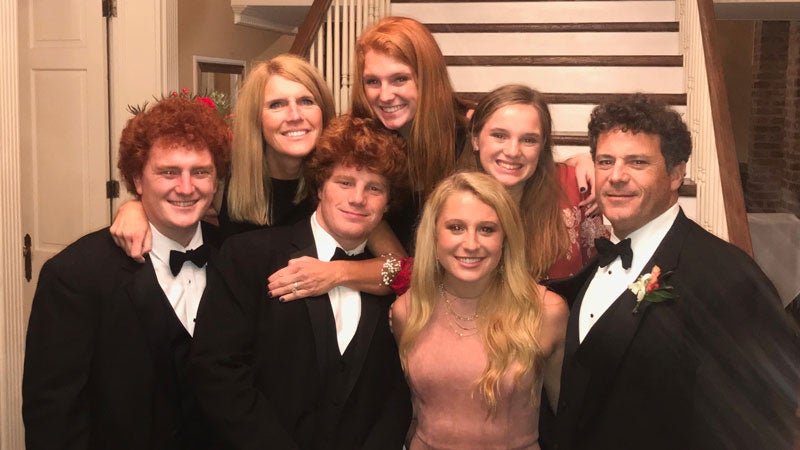By: Caroline Newman
Photos By: Mary Tweedy
Looking around Vestavia Hills, Delphine Carter saw herself in the women bustling through carpool lines and grocery stores – busy mothers who wanted to be present for their kids but who also had formidable skills that could be very useful in the workplace.
Maybe, Carter thought, they wanted to find a way to start or keeping working outside the home just like she did. To pursue projects they enjoyed and add to their family’s income while also having the flexibility to be at home when their kids were. Maybe she could help them.
That’s how Carter’s Vestavia-based company, Boulo, started in 2018. Now, four years and one global pandemic later, Boulo is a national recruiting and staffing firm with more than 9,000 potential employees – largely women but also men – in its database, ready to be paired with companies offering flexibly structured part-time and full-time jobs in everything from finance to software development.
“I just kept meeting women who would talk about how they wanted to reenter the workforce but felt like they couldn’t for different reasons,” said Carter, who worked with Birmingham-based companies Daxko and Shipt before starting Boulo and has two children, now aged 14 and 11.
“I knew there had to be companies who would really value their skills. I had a number of professional contacts already, so I just started to think about pairing those things and helping these women translate what they have been doing at home – moms are a force, they are not just sitting on the couch – to the workplace.”
Now, women like those Carter noticed can join Boulo, completing a 360-degree profile that helps them to showcase their skills in ways a resume might not.
“We help them talk about how they have exhibited leadership, initiative and innovation in their daily lives, whether that is at home or in volunteer work or other projects,” Carter said.
Members can download that profile to distribute however they want and Boulo also uses it to reach out to their nationwide portfolio of employers. Many of them are small-to-medium-sized companies who embrace offering flexibility in exchange for accessing an incredibly talented and often hidden workforce, as Carter put it.
“We work with decision makers who are feeling the direct pain of not being staffed enough and watching their teams hit a burnout state,” Carter said. “Many of our clients are concentrated in technology and services industries. Tech startups are typically very innovative in how they created their company culture. They tend to embrace generalist skillsets, allowing employees to come in and wear multiple hats, and are open to allowing them to work non-traditional hours or remotely.”
Boulo’s employer partners span the country but some, like Debra Hays, are right around the corner. Hays is the chief executive officer of ConcertIDC, a Vestavia-based software company focused on custom application development.
“I am very passionate about Boulo’s mission and helping women who have had a gap in their careers come back into the workforce,” Hays said. “I had heard of Delphine because we both live in Vestavia and our kids play lacrosse. When I needed to start recruiting, I really wanted to use Boulo and work with another local female CEO.”
So far, ConcertIDC has hired two employees through Boulo, one woman and one man, both of whom have been “fantastic,” Hays said. The company has an office that employees can use, but most of their work is done from home and from various locations, including about 1,000 employees in India. In fact, ConcertIDC recently kicked off a campaign in India, Relaunch Yourself, that focuses on helping women get back in the workforce.
“After the pandemic, remote work has become more of a norm in India and around the world,” Hays said. “We are really focused on flexibility and I would very much recommend that approach to other employers as well.”
Flexibility in location, hours and culture is the most important trait of Boulo’s partner employers, Carter said. “They don’t measure a person’s success by the amount of time someone is sitting in a seat,” she said.
Boulo itself walks the walk. Boulo employees like business development associate Stacy Ball work remote and keep flexible schedules while still growing the company.
“I have teenage kids who don’t need me every minute of every day, but with Boulo I can still drive carpool and be there when they need me,” said Ball, who previously worked in pharmaceutical sales. “I don’t need to hide it, because Boulo really encourages that flexibility. I love being able to connect other moms to those kind of jobs, and to help growing businesses find top talent that meets their needs.”
Both Carter and Ball said the pandemic fueled a spike in remote work.
“Businesses were finally ready to offer flexibility, but on the flip side, we had a membership base of over 3,000 women at that time who were somewhat frozen because they were afraid to leave secure jobs during a crisis or could not find adequate childcare,” Carter said. “Clients wanted our people and our people needed help.”
Boulo kept working to help both groups get what they needed and as the pandemic became more manageable, the company’s membership list grew to more than 9,000. As a next step, Carter is planning to expand Boulo’s online offerings to its members to include access to educational content helping women build their skills and matching them to coaches that fit the member’s specific needs.
“Women leave the workforce for three reasons: lack of flexibility, lack of career progression and lack of professional support,” she said. “We want to provide flexible job opportunities, of course, and also access to the educational content and coaches who can help our members meet their goals.”











